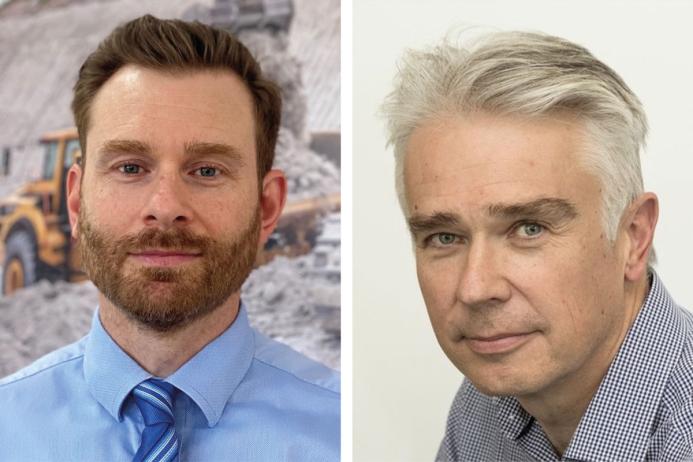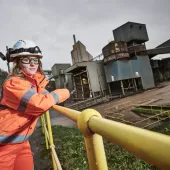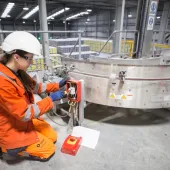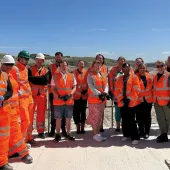Passing the Baton

First published in the December 2024 issue of Quarry Management
This year marks the 30th anniversary of the first Quarries National Joint Advisory Committee (QNJAC) meeting. As new chair Ben Uphill takes his seat at the QNJAC table, he talks about receiving the reins to the role, and new chairperson of the Plant, Fixed & Mobile Working Group, Iain Ormrod, looks to the future
‘I am delighted to be appointed as QNJAC chair,’ said Mr Uphill, ‘and to play my part in overseeing this passionate, voluntary organization which has been designed to give quarry operators clear guidance regarding legal expectations, and what they can do to ensure their operations are safe. Our seven QNJAC working groups create platforms for the meeting of minds and ideas. This enables us to share best practice and collectively devise relevant guidance intended to improve operational safety for the long term.
‘For 30 years, QNJAC has successfully devised guidance that is simple and easy to use, without the requirement for complex systems or expensive investment. Our working groups comprise: Geotechnical; Contractors; Leadership & Workforce Engagement; Communications; Health & Wellbeing; Plant, Fixed & Mobile; and Drilling & Blasting. During my term, I want to support the volunteers of each as they continue to guide people working in the quarrying and extractive industries, enabling everyone to stay safe.’
QNJAC – The next phase
Ben Uphill succeeds former QNJAC chair and managing director of EPC-UK, Ben Williams, who has now taken the role of IQ President. During his time in post, Mr Williams worked to simplify the QNJAC guidance approval process, update and rebrand the website, ease guidance access through a WhatsApp channel, build QNJAC’s social media presence, and improve communication plans.
‘I’ve every confidence that Ben Uphill’s leadership will serve to increase QNJAC’s positive influence within our industry,’ said Mr Williams. ‘I know already of his intention to successfully align the organization’s guidance with the Strategic Safety Forum and use the influence of QNJAC’s tripartite structure to successfully deliver a self-auditing tool for blasting and leadership. I feel that once brought to fruition, this will prove to be a highly enabling development, as will his plans to further the drilling and blasting and geotechnical focus of the HSE over the next two years. There are constructive times ahead.’
On receiving the mantle, Ben Uphill continued: ‘As I take QNJAC into its next phase, effective communication and working group recruitment will be key. I know from first-hand experience that the best-performing international businesses can’t have presumed knowledge of the most recent guidance that’s applicable to their operations, and it’s easy for even the biggest players in the field to lose traction at times. QNJAC’s guidance gives these organizations a valuable reference, supporting them in preventing regulations from being missed. Imparting our collective knowledge is vital to their safety success, ™ and so too are the ideas and experiences of younger professionals who are working in the field. We want to encourage the next generation to bring their opinions, talents, and capabilities to the QNJAC table, so we are better equipped to address the challenges of the industry’s changing future.’
Coming up:
Completion of the subcontractors’ self-audit tool
Leadership engagement guidance – ready to go
Geotechnical emergency list
The use of drones in quarries.
Fit for the role
Ben Uphill’s sector experience is extensive. He has developed a career over 30 years; from working as an apprentice in the 1990s, to qualifying as a mechanical engineer in the 2000s, progressing into operations in 2009, and now performing his role, since 2021, as director of operations at Sibelco. Additional achievements, including his continued work as an IQ Board Trustee and the move from IQ deputy chair to chair in September 2024, have secured his place as a professional with evident industry involvement and understanding. His roles at both director and senior management levels have seen him manage multiple operating sites; complete major strategic growth projects and contracts in aggregates and industrial minerals, including ball clay, kaolin, and silica sand; and related to his QNJAC role, implement health and safety systems, procedures, and projects to improve operations for sites and employees.

Working group focus – Plant, Fixed & Mobile
In previous editions of QM, chairs of QNJAC’s individual working groups have shared insights into their specific committee’s actions and achievements. As Iain Ormrod, operations director at Chepstow Plant International Ltd, takes over as new chairperson of QNJAC’s Plant, Fixed & Mobile Working Group, he explained more about his intention to see it grow.
‘I am delighted to be steering QNJAC’s Plant, Fixed & Mobile Working Group, taking over the position from my now retired colleague at Heidelberg Materials, Simon Day,’ said Mr Ormrod. ‘It’s great that Simon is staying on board while the transition takes place, during which time our next project, Structural Integrity of Raised Walkways, will launch. Even though structural appraisals and assessments have been in place for decades, this project focuses on raised walkways and is our response to a tragic overseas incident that could possibly happen in the UK. Simon’s commitment to the project to date has been unwavering, just as it has been with other QNJAC projects he’s been involved in. His approach has always been to keep guidance clear, concise, and usable – a format I’ll continue as I take on the chair role.
‘The handover feels apt, as I have known Simon since we both worked for Lafarge 20 years ago. When I joined QNJAC, I worked under Simon’s guidance, and prior to his retirement we discussed in detail the requirements of the role, which Simon ran with energy, dedication, and a desire to benefit the industry, an approach I fully intend to emulate as we move forward.’
Mr Ormrod harnesses 23 years of industry experience, based mainly in the quarry environment. He started his career with Lafarge (which latterly merged with Tarmac) in 2001, following a path from trainee to shotfirer, supervisor, manager, and area manager, and covering all aspects of the business, from asphalt to concrete and landfill. He joined Chepstow Plant in 2019 as general manager and was appointed operations director in August 2023.
He continued: ‘I originally joined the QNJAC Plant, Fixed & Mobile Working Group to share the learnings my team and I had gained from our own experience in addressing a safety issue that is common across the industry – articulated dumptruck (ADT) overturns. This became an industry-wide project involving experienced individuals from different companies who were willing and able to share the workload and create a highly effective piece of guidance that, I’m pleased to say, is still used today.’
Plant, Fixed & Mobile – a common thread
‘No matter what area an organization performs within, the presence of plant and the need for its operational safety unifies them all. It’s our goal for QNJAC’s guidance to add ‘flesh to the bones’ of the Quarries Regulations’ law that’s applicable to plant and its Approved Code of Practice (ACOP), helping quarry operators work safely, compliantly, and importantly, practically.’
Call to action
‘Our industry can only benefit from QNJAC’s onward growth, and for that to happen we need more members to join. We want to develop our team with fresh energy and ideas from younger members of the industry, who, even without extensive operational experience, can contribute massively, particularly regarding communication streams. My aim is to build a balanced team with a range of experiences so we can ultimately deliver guidance that can be used by all. Getting involved with QNJAC will open new members’ eyes to what can be learned from the wider industry. By meeting and sharing knowledge with people from different companies or industry sectors, experience and careers can grow. Also, taking part is not a career-long commitment. QNJAC works on ‘task and finish’ projects, allowing people to get involved with a development they are passionate about but not necessarily work on the next. Alternatively, those with the availability to keep contributing can stay on board and further expand their own knowledge and professional growth,’ said Mr Ormrod.
Outgoing chair of the group, Simon Day, is also keen to encourage members from across the industry to get involved in future QNJAC guidance projects. He commented: ‘Prior to my recent retirement from Heidelberg Materials I had been actively involved in QNJAC working groups for many years and had chaired the Plant, Fixed & Mobile Working Group since 2014. During this time members of the group helped develop many important pieces of guidance for the industry.’
He added: ‘My involvement with QNJAC working groups was also very rewarding from a personal point of view in terms of career learning and development, industry networking, and developing constructive working relationships with the HSE and other regulatory bodies. I would actively encourage anyone with an interest in creating a safer working environment to get involved, irrespective of how many years’ experience they may have in the industry – you really don’t need to be a 25-year-plus ‘veteran’ to be able to make a valuable contribution to the work that the various QNJAC groups do.’
Plant, Fixed & Mobile published guidance:
Site Energy Isolation Self Audit
The Safe Operation of Articulated Dump Trucks (ADTs) in Quarries and Surface Mining Operations
Workplace Transport & Pedestrian Interface
Management of Electrical Safety in Quarries
Winter Working
Traffic Management in Quarries
Plant Inspection Sheets
To find out more about getting involved with the QNJAC Plant, Fixed & Mobile Working Group, email: Iain.Ormrod@chepstowplant.com; or to learn about the wider organization and join one of its other groups, visit the QNJAC website: www.qnjac.co.uk

The history behind QNJAC
Roy Bush is director of health and safety for the British Aggregates Association (BAA) and has been a QNJAC member for nearly 20 years. In that time, he has taken the role of secretariat within the Health and Safety Executive (HSE), and has been a QNJAC user, contributor, and guidance promoter. Sharing details of the organization’s history in its thirtieth year, he said: ‘At the time of QNJAC’s inception, the quarrying industry had the worst fatal incidence rate of all land-based industries. It was recognized that a collaborative approach to instigating change was needed. So, a tripartite group of qualified interested parties came together to discuss matters of interest relating to health and safety – from industry (trade associations), the regulator (HSE), trade unions, training and qualification bodies, and professional organizations, including the Institute of Quarrying (IQ) and the Institute of Asphalt Technology (IAT). Since it began, QNJAC’s achievements have been industry defining.’
1999 – Consulted on the Quarries Regulations 1999 to produce the Approved Code of Practice and Guidance to Regulations (L118).
2000 – Launch of ‘Hard Targets’ health and safety initiative; company chief executive officers signed the pledge to reduce RIDDOR-reportable injuries by 50% from 2000-05.
2005 – Following the success of ‘Hard Targets’ (52% injury reduction), ‘Hard Targets 2’ was launched, to reduce RIDDOR-reportable injuries by a further 50% from 2005-10, achieving a 46% reduction in just four of the five years, with a remarkable overall reduction of 86% from 2000-10.
2010 onwards – QNJAC has continued to provide industry guidance by experts to expand on and clarify the Quarries Regulations, setting the standard by which quarry operators are judged by the regulator (HSE).
‘It is because of QNJAC, and the dedication of those involved over the years, that the quarrying industry is significantly safer now than at any other time in its history. We aspire for it to be safer still. We have come a long way, but there is still a journey to be travelled,’ said Mr Bush.
Subscribe to Quarry Management, the monthly journal for the mineral products industry, to read articles before they appear on Agg-Net.com








